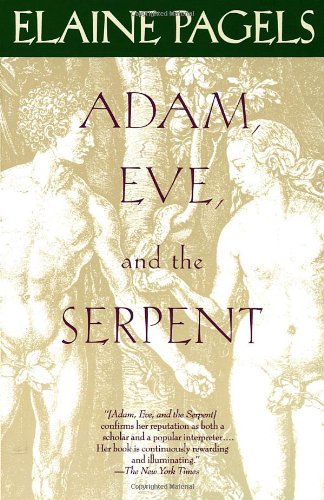Book review: Adam, Eve, and the Serpent
by Elaine Pagels
★★★★
Augustine, arguably Christianity’s greatest teacher, often stressed the sinful nature of sexual desire. Adam’s sin corrupted the whole of nature itself, and infants are infected from the moment of conception with the disease of original sin. When did this idea come about that sex is inherently sinful? When did the fall become the Fall?
In Genesis 1, God gifted the power of earthly rule to Adam. Yet, in the late fourth and fifth centuries, this message began to change. Adam’s prideful desire for self-government led to the fall—I mean, the Fall—of mankind, and ever since, humanity has been sick, helpless, irreparably damaged. Human beings are incapable of self rule, not in any genuinely good way.
Says Augustine, “even the nature of the semen from which we were to be propagated” is “shackled by the bond of death.” Every being conceived through semen is born contaminated with sin. Christ alone is born without this sin, this libido. Because of Adam’s disobedience, “the sexual desire of our disobedient members arose in those first human beings.” These members are rightly called pudenda [parts of shame] because they “excite themselves just as they like, in opposition to the mind which is their master, as if they were their own masters.”
Okay, perhaps I have overemphasized Augustine and his hangup about sex. There’s more to the book, and Pagels is a good writer who manages to turn even this dubious topic into a fascinating read.












 354 Circles
354 Circles
 603 Goodreads Friends & Fans
603 Goodreads Friends & Fans

 Hello! I'm an author, historical Jesus scholar, book reviewer, and liberal Christian, which means I appreciate and attempt to exercise the humanitarian teachings of Jesus without getting hung up on any particular supernatural or religious beliefs.
The Bible is a magnificent book that has inspired and spiritually fed generations for thousands of years, and each new century seems to bring a deeper understanding of life’s purpose. This is true of not only Christianity; through the years, our age-old religions are slowly transforming from superstitious rituals into humanitarian philosophies. In short, we are growing up, and I am thrilled to be riding the wave.
I avidly read all thought-provoking religion titles. New authors: I'd love to read and review your book!
Hello! I'm an author, historical Jesus scholar, book reviewer, and liberal Christian, which means I appreciate and attempt to exercise the humanitarian teachings of Jesus without getting hung up on any particular supernatural or religious beliefs.
The Bible is a magnificent book that has inspired and spiritually fed generations for thousands of years, and each new century seems to bring a deeper understanding of life’s purpose. This is true of not only Christianity; through the years, our age-old religions are slowly transforming from superstitious rituals into humanitarian philosophies. In short, we are growing up, and I am thrilled to be riding the wave.
I avidly read all thought-provoking religion titles. New authors: I'd love to read and review your book!
 Hi! While Lee writes the articles and reviews the books, I edit, organize, and maintain the blog. The views expressed here are Lee's but I'm his biggest supporter! :-)
Hi! While Lee writes the articles and reviews the books, I edit, organize, and maintain the blog. The views expressed here are Lee's but I'm his biggest supporter! :-)
Connect With Me!